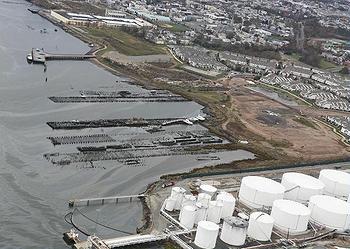
WASHINGTON, DC, January 21, 2015 (ENS) – Three companies affiliated with Shell Oil Company will pay a total of $900,000 for selling gasoline and diesel fuel that violated U.S. federal standards.
Equilon Enterprises LLC, doing business as Shell Oil Products US, Motiva Enterprises LLC, and Deer Park Refining Limited Partnership, has agreed to pay the $900,000 civil penalty to resolve alleged violations of the Clean Air Act at refining, distribution, and retail facilities around the country.
The U.S. Environmental Protection Agency alleges that these companies violated the Clean Air Act by selling gasoline with elevated levels of ethanol, transgressing the gasoline volatility and sulfur standards and the diesel sulfur standards, and committing recordkeeping, reporting, sampling and testing violations.

The result has been excess emissions of harmful air pollutants from motor vehicles, which threaten public health and the environment, the agency said.
“Fuel standards established under the Clean Air Act play a major role in controlling harmful air pollution from vehicles and engines,” said Cynthia Giles, assistant administrator for EPA’s Office of Enforcement and Compliance Assurance.
“If unchecked, these pollutants can seriously impair the air we breathe, especially during summer months when they can reach higher levels,” said Giles. “This settlement makes clear that if companies fail to produce fuels that comply with federal standards, they will be held accountable.”
The EPA alleged that:
* – Shell sold mislabeled diesel fuel – fuel labeled ultra-low sulfur diesel that was actually low sulfur fuel – at two gas stations in Northern Virginia.
Low sulfur diesel fuel contains up to 500 parts per million of sulfur; ultra-low sulfur diesel may not exceed 15 parts per million of sulfur.
EPA inspectors discovered the violations at the stations, one of which came after receiving a complaint from a consumer.
* – Shell sold over 4.2 million gallons of gasoline that exceeded a fuel standard for volatility, known as the Reid Vapor Pressure level, that helps control ground-level ozone, or smog, during summer months.
Gasoline with higher volatility results in increased emissions of volatile organic compounds, which contribute to the formation of ground-level ozone. Breathing ozone can trigger health problems, particularly for children, the elderly and people who have lung diseases such as asthma.
* – Shell distributed about 700,000 gallons of gasoline from its Sewaren, New Jersey terminal that contained elevated levels of ethanol.
Excess ethanol in gasoline can harm emission control components on some vehicles and engines.
The Reformulated Gasoline Survey Association, an organization that works to improve industry compliance with Clean Air Act fuel standards, identified the fuel with excess ethanol after surveying Shell retail stations in Irvington, New Jersey and Staten Island, New York, and notified EPA.
* – Shell failed to follow protocols for sampling, testing, reporting and recordkeeping requirements that help ensure compliance of its fuel with federal standards. Shell proactively reported some of these violations to the EPA.
Recordkeeping, reporting, sampling and testing violations reduce EPA’s ability to know whether fuels meet certain standards and can lead to increased vehicle emissions.
The EPA says there are hundreds of different compounds and elements emitted from passenger cars, trucks and non-road equipment. Although vehicle emission controls have improved, emissions from motor vehicles are “a substantial portion of all air pollution,” the agency says.
The Shell companies’ diesel sulfur standard violations resulted in excess particulate matter, sulfur oxides, and nitrogen oxides.
The gasoline volatility violations led to an increase in volatile organic compounds, which contribute to the buildup of ozone during the summer ozone control period. The elevated levels of ethanol in gasoline can harm emission control components on some vehicles and engines.
Shell Oil Company is the U.S.-based subsidiary of Royal Dutch Shell, and is a natural gas producer, natural gas marketer, gasoline marketer and petrochemical manufacturer.
Shell Oil Company and Saudi Aramco subsidiaries each own 50 percent of Motiva Enterprises LLC. Motiva owns three refineries located in Convent and Norco, Louisiana and Port Arthur, Texas, which have a combined refining capacity of over one million barrels per day, making it the third largest manufacturing company in the region.
Equilon Enterprises LLC, doing business as Shell Oil Products US, operates as a subsidiary of Shell Oil Company. It offers refining, marketing, and transportation services for petroleum products and operates a network of gasoline stations in the United States. The company has three crude oil refineries and operates lubricant plants, pipelines, and terminal systems in the United States.
Deer Park Refining Limited Partnership is a 50-50 joint venture of Shell Oil Company and a subsidiary of Petroleos Mexicanos, which owns the Deer Park Refinery in Deer Park, Texas.
Copyright Environment News Service (ENS) 2015. All rights reserved.
